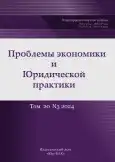The Study of the Impact of the Environmental Situation on the Migration of the Region
- Authors: Kontsevaya N.V.1
-
Affiliations:
- Financial University under the Government of the Russian Federation
- Issue: Vol 20, No 3 (2024)
- Pages: 146-151
- Section: Mathematical, Statistical and Instrumental Methods in Economics
- URL: https://bakhtiniada.ru/2541-8025/article/view/263764
- EDN: https://elibrary.ru/COPJEJ
- ID: 263764
Cite item
Abstract
The paper presents an analysis of the causes of the negative trend in the outflow of population from the Krasnoyarsk Territory. The factors that significantly affect migration have been identified. An econometric multifactorial model is proposed that allows us to assess the causes of outflow, rank the impact of environmental and economic causes, assess relative changes in the structure of outflow, and obtain interval forecast estimates of the migration process. The analysis of responses to the author's development of a6 questionnaire for residents of the Krasnoyarsk Territory for reasons of departure is carried out. The correlation of the causes of migration identified as a result of the survey with the causes identified during econometric modeling is shown. The degree of influence of the environmental situation on the motivation of the population when leaving the Krasnoyarsk Territory is substantiated. Recommendations are formulated to change the current negative trend with population migration.
Full Text
##article.viewOnOriginalSite##About the authors
Natalia V. Kontsevaya
Financial University under the Government of the Russian Federation
Author for correspondence.
Email: NVKontsevaya@fa.ru
ORCID iD: 0000-0002-9353-5463
SPIN-code: 3574-0050
Cand. Sci. (Econ.), Associate Professor, Associate Professor of the Department of Modeling and System Analysis
Russian Federation, MoscowReferences
- Cresswell, Tim. (2011). Mobilities I: Catching Up. Progress in Human Geography. 35. 550-558. 10.1177/0309132510383348.
- Donets, Ekaterina & Chudinovskikh, Olga. (2020). Russian policy on assistance to the resettlement of compatriots against the background of international experience. Population and Economics. 4. 1-32. 10.3897/popecon.4.e54911.
- Huppert H.E., Sparks R.S. Extreme natural hazards: population growth, globalization and environmental change. Philos Trans A Math Phys Eng Sci. 2006 Aug 15;364(1845):1875-88. doi: 10.1098/rsta.2006.1803. PMID: 16844639.
- King, Russell. (2012). Geography and Migration Studies: Retrospect and Prospect. Population, Space and Place. 18. 134—153. 10.1002/psp.685.
- Migration and risk: net migration in marginal ecosystems and hazardousareas. Environmental Research Letters, 7, 45602 http://iopscience.iop.org/artic le/10.1088/1748-9326/7/4/045602/pdf.
- Ryazantsev S.V., Moiseeva E.M. Migration in the Context of the Demographic Development of the Russian Far East // Herald of the Russian Academy of Sciences. 2022. № 1. P. 65–75.
- Sheller M., Urry J. Mobilizing the New Mobilities Paradigm // Applied Mobilities. 2016. Vol. 1(1). p. 10–25. doi: 10.1080/23800127.2016.1151216.
- Granberg A.G. On the Program of fundamental research of spatial development of Russia // Region: economics and sociology. 2009. No. 2. pp. 166–178.
- Denisenko M.B., Chudinovskikh O.S. Reasons for the unrealization of the provisions of the Concept of the state migration policy of the Russian Federation // Demoscope Weekly. 2017. No. 753-754. pp. 31–41.
- Lavrikova Yu.G., Suvorova A.V. Optimal spatial organization of the region's economy. Search for parameters and dependencies // The economy of the region. 2020. No. 4. pp. 1017–1030.
- Menshin R.V., Moiseeva E.M. Migration of the Siberian population: trends and problems of regulation // Nauka. Culture. Society. 2020 No. 1. pp. 13–22.
- Soyan Sh.Ch. Ecological problems of Siberian regions // Natural resources, environment and society. 2019 No. 3 pp. 34–38.
- Stroev P. V., Kan M. I. Spatial mobility of the population. Economic and social aspects //Economy. Taxes. Right. —2016. Vol.9. No. 6. pp.35–41.
- Chertov O.G., Morozova G.F., Borzunova T.I. The influence of environmental factors on population migration in Russia (on the example of the Volga and Ural federal districts) // Bulletin of the Altai Academy of Economics and Law. 2020. No. 11-3. pp. 560–567. URL: https://vaael.ru/ru/article/view?id=1463.
- Strategy-2025. R. III. The main problems of spatial development of the Russian Federation. http://static.government.ru/media/files/UVAlqUtT08o60RktoOXl22JjAe7irNxc.pdf (accessed 05/20/2024).
Supplementary files













